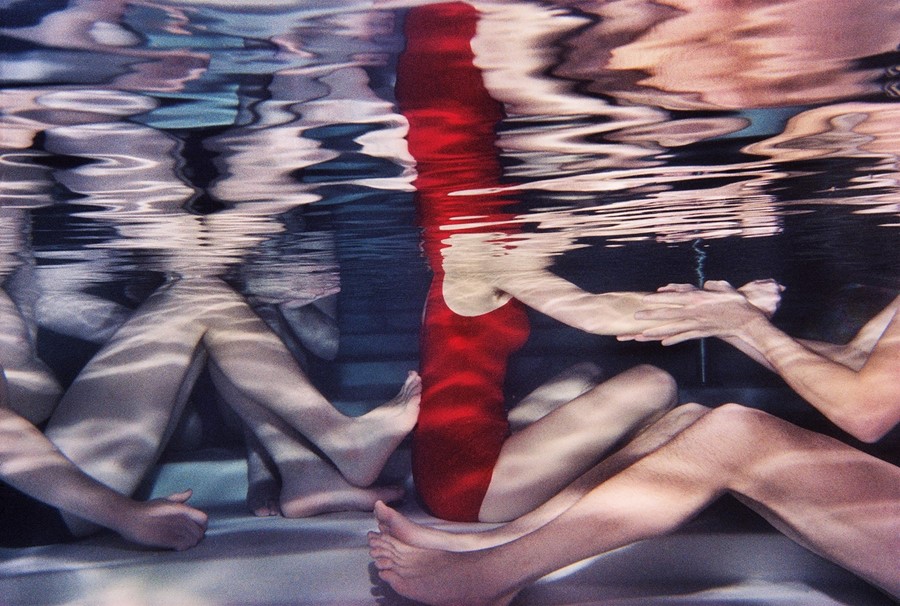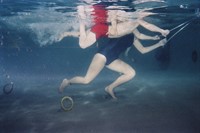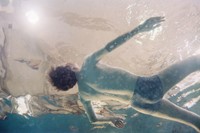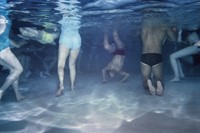After a near-death experience in the ocean as a young boy, Larry Sultan set out on a brave mission to photograph swimmers in San Francisco’s public pools during the 1970s and 80s
Inside the Larry Sultan studio, a small box of the 8x10 proofs from the photographer’s Swimmers series would occasionally resurface and reveal a phantasmagoria of beauty and mystery plumbed from the cerulean depths of public pools in the San Francisco Bay Area during the 1970s and 80s.
The series emerged from the scars of a life-and-death battle Sultan carried throughout most of his life. “When I was 12 I almost drowned in the ocean …. Water is the only bit of nature I know that we can’t control, that seems overwhelming when you enter it,” he told students at the San Francisco Art Institute in 1980, sharing his motivations and discoveries of this work-in-progress.
For Sultan, art embodied the paradox of existence itself: to create, you must let go. Willing to fully submerge himself in the very substance that almost took his life in order to confront, reconcile, and release his past, Sultan took the plunge into the unknown to reimagine the possibilities of photography itself at a pivotal point in his early career. But the work has largely gone unseen until now. With the release of Swimmers (Mack), this seminal chapter of the artist’s career finally receives its proper due.
Inspired by documentary photographs in a Red Cross swimming manual, Sultan initially conceived of Swimmers in black and white, but set the work aside in 1974 to collaborate with Mike Mandel. Together they created Evidence (1977), the groundbreaking photography book drawn from public archives that brilliantly subverted notions of art, photography, authorship, commerce, propaganda, and ephemera with a wink and a smile. Evidence was a paradigm shift, one that required acute and sustained focus on the relationship between idea and iconography. To fully immerse himself inside a conceptual framework, Sultan later explained, “These pictures were made at a time when I found that much of my artistic activity was cut off from my body.”
Swimmers presented the perfect counter-extreme: an intense, physical experience where instinct and intuition reigned supreme. When Sultan returned to the series in 1978, he opted to shoot in colour after a friend offered to develop the film for free at a local photo lab. It was a brilliant stroke of luck, as the colours added an evocative, hallucinatory element to the images.
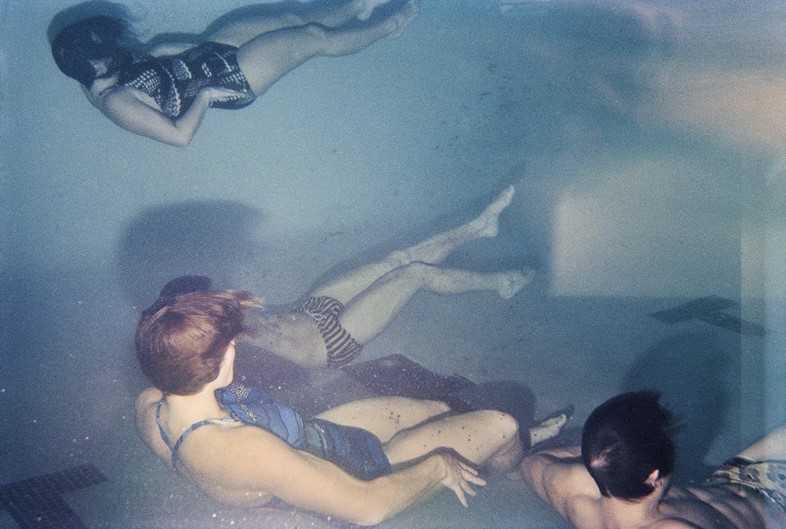
With Swimmers, Sultan was now behind the camera, underwater, and profoundly exposed. Donning only swim trunks, goggles and a snorkel, he submerged himself in the murky realms of the unknown. Facing his fear of death, all bets were off. “Larry could ask questions about what it’s like to photograph, to be alone, and just to be,” Kelly Sultan, Larry’s wife, tells AnOther. “It got very personal very quickly in a way that he didn’t expect,” she continues. “He found himself in this uncharacteristically male pursuit of romantic, lush, beautiful images and that was discomforting to him. They were so divergent from his work with Mike and from what was happening around him in art and with gender roles. He was unsettled but intrigued, and that’s why he persisted for eight years.”
While working on Swimmers, Sultan began looking at his parents’ old home movies and collecting stills. After reviewing the frames, he noticed water formed both motif and metaphor, and from this revelation, the series Pictures from Home began to take shape. Although Swimmers continued until 1982, the work went largely unseen until Kelly Sultan happened upon that small box of proofs one day while reorganising the archive. Looking through the images, she was spellbound and understood there was more to the series than anyone – including her husband – had known. Most of the negatives went unprinted and unseen. “That magical little box was just the tip of the iceberg,” Kelly remembers. “We had the benefit of digitising them and seeing them on the monitor. I spent hours at the monitor in this dark underworld for a week and it kind of changed your brainwaves. Scrolling through the strips of negatives, you felt like you were submerged in the water swimming with him, approaching things then turning and seeing something else. It had a cinematic quality that was arresting.”
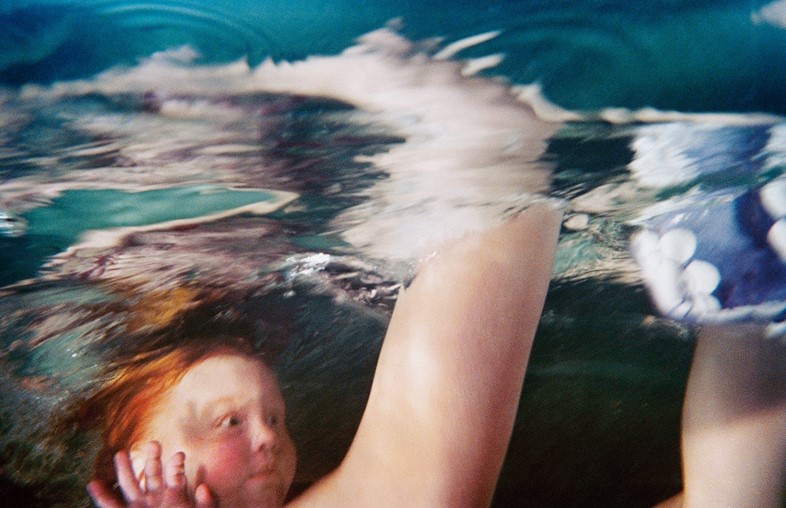
Drawn to the ambiguities of daily life, Sultan recognised that art was a way to insert a touch of anarchy and magical realism to peel back the veils of perception in his search for a deeper truth. Swimmers is flush with meaning and metaphor, a veritable Rorschach test of the imagination. “It’s almost more what you leave out than what you include that fascinated him,” says Kelly. “And of course, a continual pursuit of how to lose control in a new way so that you are not seeing what you already know. And putting something between your brain and the camera, in this case all the obscurities and restrictions of water while using a handheld flash. There’s this awkwardness that leads to a lot of failure but also often works.”
Swimmers, like Evidence and Pictures From Home, is an extension of Sultan’s philosophical approach, which demanded that he liberate himself from all existing tropes. “Part of the difficulty facing photographers is that almost any subject matter has accumulated a representational history, so to find a new discursive space, a space to wander around those subject matters, is a real challenge,” Sultan previously explained. “If I know too much, if the narrative is too well formed, I’m making pictures that are illustrative, and as a maker, that’s not interesting. As a viewer, that’s not interesting.”
Swimmers by Larry Sultan is published by Mack and is out now.
